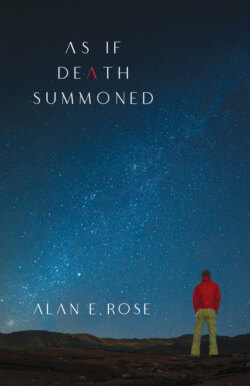Читать книгу As If Death Summoned - Alan E. Rose - Страница 11
ОглавлениеFriday, February 24, 1995
10:58 p.m.
Providence Hospital, Portland, Oregon
Sometimes I’m wandering in a blizzard, knee-deep in snow, unable to see six feet in front of me. Sometimes it’s spring, the brush and heath decked out in their dusty-drab, Down Under version of green. Sometimes it’s autumn. Yet always the same dream: I’m lost. I’m alone. And I’m looking for someone.
“For your partner, Gray?” O’Shaughnessy asks.
“No. Even in the dream I know he’s dead. Someone else. I’m looking for someone else.”
• • •
Opening my eyes, I squint against the fluorescent light, grounding myself once more in this second-floor waiting room as the dreamscape fades. Must have dozed off. The room remains empty, hospital sounds murmur and hum and ping in a low-level audio blur. Otherwise it’s quiet. Less trauma and drama than the first-floor waiting room next to ER. This is for the long-term emergencies. Like me.
I pull myself up in the chair, checking the clock on the wall. Approaching eleven. But I’m operating on East Coast time; as far as my body is concerned, it’s 2:00 a.m. Too bad I’ve never been able to sleep on planes, buses, trains, in cars— anything that’s not my bed— so unlike Gray, who could sleep on a roller coaster. A flicker on the television screen draws my attention. Eleven o’clock news. I find the remote and listlessly aim it at the TV, taking it off mute.
“Tonight, a major setback in the Department of Justice’s investigation into allegations of corruption by members of the Portland Police Bureau . . .”
I’m immediately, fully awake. The story has been dominating local news, and, like most of the city, I’ve been watching since it broke in early January.
“The primary witness in the Department of Justice’s investigation was shot this afternoon by an unknown assailant and is at this hour reported to be in critical condition. The witness, whose identity has not been released, presented evidence alleging extortion and civil rights abuses by members of the police bureau . . .”
The anchor goes to a reporter on scene at the hospital, this hospital, who is downstairs and outside in the chilly temperatures. She has little to add, so she notes the heavy police presence, that the witness remains in critical condition and is under round-the-clock guard. She reminds viewers there is still a second witness, a police officer named Blake O’Connor, who recently came forward to testify. He looks young in the official department photograph shown on the screen. Third-generation police officer, I’d read. His face and name have been in the news during the past week. Originally, his identity was suppressed, but once leaked by the grunge press, he was identified by the mainstream media as well. By testifying against his fellow officers, O’Connor was breaking the police’s unwritten Code of Silence— the same code, it was pointed out, as the criminal underworld’s. A recent editorial in The Oregonian commended the young officer for his courage and integrity, hailing him as a true representative of the men and women who loyally serve Portland on the police force. The mayor praised him. The police chief praised him. He was toast.
At the end of the newscast, I switch off the television and feel a new heaviness descend over me. I know more about this investigation than I should, more even than the police or the FBI. I know way too much . . .
